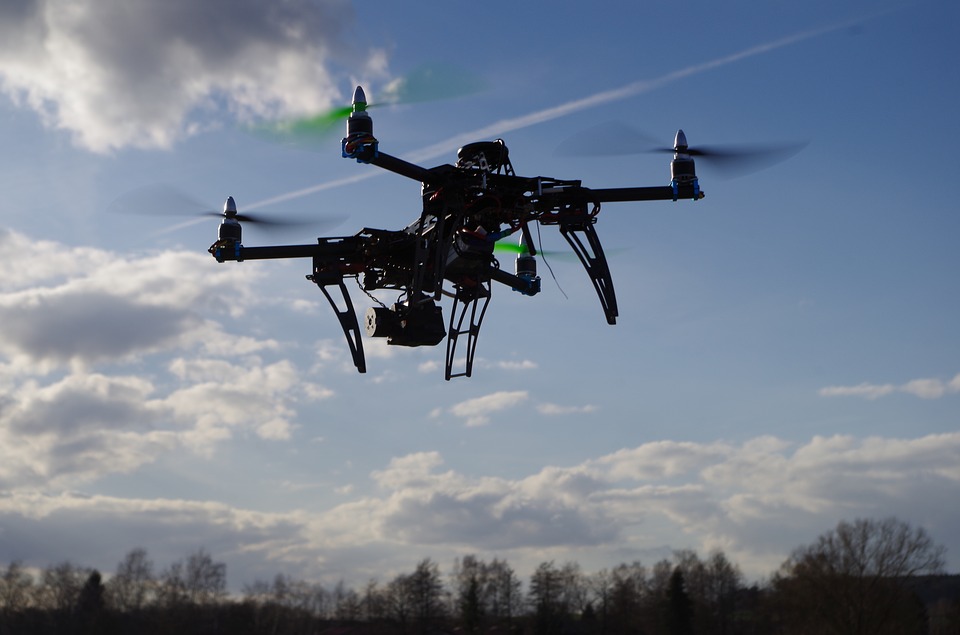Critics of the arms trade have condemned a drone project in schools run by an arms firm linked to alleged war crimes in Yemen.
Four schools in Fife – Auchmuty High, Glenrothes High, Glenwood High and Inverkeithing High – took part in a competition recently when schoolchildren were asked to build a quadcopter, a type of remotely piloted air system also known as a drone.
Designed for second year pupils by an American company called Raytheon, the “Quadcopter challenge” was an attempt – the firm said – to engage young people in science, technology, engineering and maths.
Fife Council said the project would create opportunities for children but Campaign Against Arms Trade and Drone Wars UK have accused the US multinational of trying to “normalise” war and of using schools as “propaganda vehicles” for the arms trade.
Raytheon has a factory in Glenrothes, Fife, where it makes laser guided missiles and employs some 600 people.
The firm describes itself as the “world’s premier missile maker” and is a major contributor to the Scottish economy having exported some £500m of technologies since 2002.
But the company has been at the centre of controversy over the past year amid claims of war crimes in Yemen, allegedly by a coalition of military forces dropping smart bombs called Paveway IV missiles, supplied by Raytheon.
The UN estimated last month that more than 10,000 people have died in Yemen’s war, when officials described the situation as “tragic”.
The conflict is between military forces loyal to the ousted Yemeni President, Abdrabbuh Mansour Hadi, and Zaidi Shia rebels known as Houthis.
An Arab coalition led by Saudi Arabia in support of President Hadi – backed and armed by the UK – uses UK-made warplanes dropping Paveway missiles but it has been accused of dozens of war crimes resulting in an international outcry and repeated calls for a suspension of UK arms sales to the Saudis.
In January the UN said the coalition had committed 119 violations of International Humanitarian Law (IHL), adding it had uncovered “widespread and systematic” attacks on civilian targets including schools, hospitals and markets.
The Ferret revealed recently that a code on a fragment of bomb found at the site of an alleged war crime in January linked the missile to Raytheon in Scotland.
The Saudi-led coalition has denied targeting civilian targets.
Aside from producing smart bombs, Raytheon also makes drones for the US military including the Raytheon Cobra which can fire missiles.
In May, it emerged that Raytheon was pioneering drone technology which would allow the US military to deploy “swarms of miniaturized drones for attack” and the company boasts that drones are like bringing “a gun to a knife fight”.
A statement on Raytheon’s website says: “The company also produces forward-looking drones like the tube-launched Coyote and the Silver Fox expeditionary system, along with next-generation UAV control systems like advanced mission control for the Global Hawk, Triton and MQ-8 Fire Scout, an unmanned helicopter that recently deployed on the USS Coronado Littoral Combat Ship.
“These technologies will help realize two important objectives of the Department of Defense’s Third Offset Strategy: To enhance the human-machine connection through technology, and to create overmatch – the overwhelming power to defeat adversaries, like bringing a gun to a knife fight.”
Criticising the Fife school project, CAAT said: “Raytheon has sold weapons to oppressive regimes around the world. Right now its bombs are being used in Yemen. It is not running this competition because it cares about young people or learning.
“It is doing it because it wants to normalise what it does, and encourage young people to work in the arms trade. The drones that Raytheon produces are not the kind that are made as school projects, they are the kind that can be used in war zones.
“Schools exist to educate, they should not be used as propaganda vehicles for arms companies and those that profit from war and conflict.”
Chris Cole of Drone Wars UK said: “We too share CAAT’s concerns. Arms companies like Raytheon want to portray their work to children as fun and exciting, yet the reality is that around the globe children are suffering in wars fuelled by their products.
“This is particularly the case at the moment with Raytheon supplying bombs to Saudi Arabia which are being used in Yemen.
“Raytheon’s research department is engaged in extremely controversial work around the use of armed drones, including the arming of small drones which will enable them to be used in urban areas far away from any battlefield, increasing the autonomy of large armed drones, and building swarming drones to overwhelm a country’s defences.
“It’s no wonder that Raytheon’s PR department are keen to sanitise their image by working with schoolchildren to build toy drones.”
In response to the above crticism, a spokesperson for Raytheon said: “Raytheon UK provides a comprehensive programme of STEM (science, technology, engineering and maths) activities throughout the year in an effort to inspire the next generation to choose STEM careers.
“Working with schools, helping to create courses at universities, attending major outdoor events such as airshows, organising competitions and challenges all help to kindle a passion for STEM subjects in young people and develop a future generation with the right skill set to drive the UK’s technology agenda.”
Pamela Stevenson, enterprise and business development lead officer at Fife Council, said: “This is just one of the many industry projects we run as part of our Culture of Enterprise programme. We work in partnership with Education and local companies to create opportunities for our young people to learn and bring Science Technology Engineering and Maths (STEM) to life.
“This competition was created to encourage young people to consider careers in STEM industry organisations, which is a priority for Fife.
“The programme creates opportunities for young people to take the theory of their classroom and contextualise it into practical application, the building of a quadcopter from an engineering perspective directly.”














